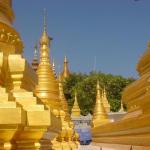Myanmar Traditions
 Religion in Myanmar - Buddhism (89%, mostly - Theravada and Hinayana "), there are also Christians (4%), Sunni Muslims (4%), Hindus and adherents of traditional indigenous beliefs.
Religion in Myanmar - Buddhism (89%, mostly - Theravada and Hinayana "), there are also Christians (4%), Sunni Muslims (4%), Hindus and adherents of traditional indigenous beliefs.Customs and traditions of Myanmar
Many Burmese bad speak English (language teaching introduced in the school curriculum), so communication with local residents usually do not cause problems. Many labels, signs and menus are duplicated in English. The Burmese language belongs to the Tibeto-Burman language family, tonalite, has many rules of pronunciation, and therefore quite unusual for a European ear, and difficult to master.
Religion is a very important place in public life, many military regimes succeed each other in the leadership of the country, even had to include the religious tenets of their political program. In each village, even in the tiny mountain villages, have their own temple or monastery, in which every Burmese boy holds a certain period, studying the religious tenets and ecclesiastical language "Pali". Construction of temples are everywhere, even in the poorest areas. Relation to places of worship in Burmese sort of - on the one hand, traditional for all Buddhists, the awe and reverence, on the other - quite a few conventions and taboos that restrict any part of worship.
In some far-off residents of Myanmar are very similar to our compatriots. Firstly, the similarity lies in the fact that they have an irresistible passion for the repair of roads, so the road here, for the most part, very bad, or simply absent. Secondly, based on his own well-known reasons, the residents love to rename the names of cities and temples, where there is a certain confusion in the guidebooks - even the country's name written in different places in different ways, then Burma, Myanmar. But, in spite of some eccentricities, they are extremely friendly and hospitable to tourists, who, unfortunately, not often zhaluyut his visits to Myanmar.
Creek, noise and hassle on the street - quite a rare phenomenon. Also characteristic of local residents is cleanliness. Unlike some neighboring countries, here and the streets of their cities are trying to keep clean and abide by the hygiene standards. The only conspicuous violation of the norms of purity - for Myanmar traditional chewing betel, the characteristic red spots which can be found on any roadway, even in the center of the capital. In general low level of life as a little beggars, and beggars can not see at all.
Official holidays and weekends in Myanmar
January 4 - Independence Day.
February 12 - Day of the Union.
March 2 - Peasant's Day (anniversary of the coup in 1962).
March 27 - Day of the Armed Forces.
April 13-17 - Feast of water "Mach Tindzhin and New Year.
May 1 - Labor Day.
July 19 - Day of the Martyrs Day (Martiri).
November 18 - National Day.
December 25 - Christmas.
Burmese week 8 days, Wednesday is divided into two days. Therefore, with the dates of any activities should be read especially carefully.
Getting around the country is limited. For foreigners there is a special card, which marked areas and cities, in which entry is forbidden. Some places can be visited only under the supervision of the national companies and at a certain form of transport.
Crime in the country is extremely low, the police severely punishes any attempt to go begging or speculation. Theft and pickpocketing are also rare, but recent figures for these types of crimes is slowly but surely, growing.
Burmese week 8 days, Wednesday is divided into two days. Therefore, with the dates of any activities should be read especially carefully.
It is forbidden to photograph military (and military) and strategic targets. Pictures in churches and museums is prohibited or is taking an additional fee. Sami locals are usually happy to pose, but do not like when they shoot on the sly. On entering the Buddhist temples have to remove not only shoes, but often toes.
Entrance to most sights and museums in the country charge. Upon entering the temple complex, not to pay separately for each temple, you can purchase a subscription to tour throughout (normally cost around $ 10).
In most shops can and should haggle.
Natural hazards in Myanmar
The territory of Myanmar prone to many diseases, which should always be considered when planning your trip. Certificate of vaccination against yellow fever is required from all travelers arriving from infected areas. Recommended prophylaxis of malaria, the risk that exists in areas located below 1000 meters above sea level (the Karen, Chin, Kachin, Kaya, Mon, Shan and Rakhine, Bago Division in the district and the capital). Everywhere there are ascariasis, hookworm disease, trachoma, etc. Recommended vaccinations against hepatitis A, B and E, cholera, tetanus and polio. Registered centers spread of plague, rabies, dysentery, dengue fever, Japanese encephalitis and other diseases, so certain preventive methods when visiting the interior of simply required. You can not drink the water from the tap and from natural sources. Honey, treacle, prepared on the street, is also regarded as potentially dangerous. It should drink only boiled or bottled water (industrial packaging), thoroughly washed and peeled vegetables and fruits. Dairy products are not pasteurized and are considered potentially dangerous to health. Meat, fish and seafood should only eat thoroughly fried or cooked past. The use of pork, green salads and products based on vegetable oil mayonnaise can be risky.